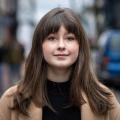
As the return of Brighton Festival approaches, we have rounded up the best free events.
The major arts festival will return to the city from May 6 to 28 with a plethora of music, dance and theatre performances along with an array of art installations.
Children’s Parade

More than 5,000 school children will hit the streets of Brighton on Sunday, May 7, for the annual Children’s Parade to celebrate the start of Brighton Festival.
Community arts charity Same Sky has worked with teachers, students and volunteers to make magnificent sculptures and showstopping costumes and to choreograph dance routines and compose rousing chants that encapsulate this year’s parade theme "gather round".
Robert Batson, executive producer at Same Sky, said: “The Children’s Parade is a hallmark event of Brighton’s cultural identity, one where we give the city over to the kids and pupils and let them run rampant with their incredible floats, ideas, costumes and music.”
Groundswell at St Peter’s Church

Groundswell is the UK premiere of a free, immersive installation running throughout this year’s festival, exploring the ground beneath our feet and how we tread upon the earth. Created by award-winning Australian artist Matthias Schack-Arnott, bystanders are invited on to a raised platform where every person’s movement sets in motion thousands of illuminated balls to create oceanic waves of sound and light, highlighting the power of collaboration.
Groundswell is presented in partnership with Brighton Fringe and made possible by The Pebble Trust, whose annual support of Brighton Festival’s major productions and installations offers audiences innovative and unique ways of seeing and experiencing the city.
A Weekend Without Walls

Living pictures, an afro-futuristic dance party and a relaxing cup of tea are among the free events at this year’s A Weekend Without Walls (May 27-28).
Taking place at locations across Brighton and Crawley, highlights include:
- Brighton Festival commission New Work, a playful and inclusive dance duet by choreographer Jamaal Burkmar and Candoco Dance Company in St Peter's Square South.
- Ancient Futures will see a group of flamboyant "Afrinauts" arrive and build an encampment in Jubilee Square. In the evening, the audience is invited to join them for a spectacular dance party.
- Teabreak in Valley Gardens North, which provides an opportunity to unwind with a brew served from a hand painted tuk tuk, while enjoying an audio journey and dance performance.
- Mughal Miniatures, inspired by the traditional art of Indian and Persian miniature painting. Performers in sumptuous colourful costumes will create a series of pop-up living pictures that evoke scenes of Indian princely courts and lush gardens with a contemporary twist to the delight and surprise of passers-by.
Playbook
A new piece of acrobatic theatre by award-winning Australian circus company Gravity and Other Myths. Eight performers will travel across the Royal Pavilion Gardens and Valley Gardens North in the evenings of May 12 and 13. Accompanied by portable light and sound, this is a playful, responsive piece of performance art that celebrates physicality, unity and the beauty of movement.
Parachute (Phoenix Art Space)
Explore the youth culture of South London and the life of photographer Reuben Bastienne-Lewis in his first solo exhibition and a world premiere, Parachute (May 6 to July 2).
Acting as a diaristic photographic record, Bastienne-Lewis uses intimate portraits of people, places and events to form a visual autobiography of South London enlivened by friendship, community and love.
A Future Memory (Brighton CCA Dorset Place)
Inspired by ideas of existence and remembrance, the exhibition in Dorset Place A Future Memory (May 6 to 27) from South-East London painter Mohammed Adel offers a window into the nuances of his dual British-Bengali identity.
He pairs family albums and imagery and notions of culture and space with ambiguity, intangibility and awkwardness. Using his own home as a reference, Adel’s paintings expose the tensions between the familiar and the distant and the personal and the universal to reflect the gap that exists between identities.
Adel said: “The idea came from thinking about how we remember existing as something different to memory and how I would remember myself existing in my family home when one day I am no longer there.”



Comments: Our rules
We want our comments to be a lively and valuable part of our community - a place where readers can debate and engage with the most important local issues. The ability to comment on our stories is a privilege, not a right, however, and that privilege may be withdrawn if it is abused or misused.
Please report any comments that break our rules.
Read the rules here